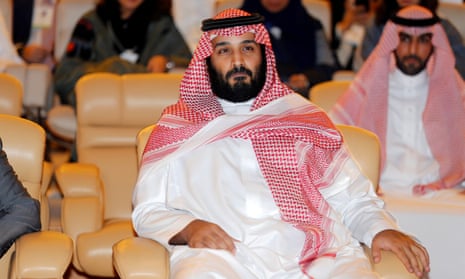Saudi Arabia arrested 11 princes, including a prominent billionaire, and dozens of current and former ministers, reports said, in a sweeping crackdown as the kingdom’s young crown prince consolidates power.
Saudi King Salman appointed two new ministers on Saturday to key security and economic posts, removing one of the royal family’s most prominent members as head of the national guard, as part of a series of high-profile sackings that sent shock waves in the kingdom.
The king also announced the creation of a new anti-corruption committee chaired by crown prince Mohammed bin Salman which Al Arabiya TV said had already detained 11 princes, four current ministers and tens of former ministers. The suspects were not named.
The state-run Saudi press agency said the commission’s goal was to “preserve public money, punish corrupt people and those who exploit their positions”.
Saudi billionaire Prince Al-Waleed bin Talal was among those arrested, Saudi news websites said, though there was no official confirmation.
An aviation source said security forces had grounded private jets in Jeddah, possibly to prevent any high-profile figures from leaving.
The kingdom’s top council of clerics tweeted that anti-corruption efforts were “as important as the fight against terrorism”, essentially giving religious backing to the crackdown.
“The breadth and scale of the arrests appears to be unprecedented in modern Saudi history,” said Kristian Ulrichsen, a fellow at the Baker Institute for Public Policy at Rice University in the US.
“The reported detention of Prince Al-Waleed bin Talal, if true, would send shock waves through the domestic and international business community.” .
The cabinet reshuffle saw Prince Miteb bin Abdullah replaced as minister of the national guard by Khaled bin Ayyaf, while economy minister Adel Fakieh was removed in favour of his deputy Mohammed al-Tuwaijri, according to a royal decree carried by state-run media.
Prince Miteb, the preferred son of the late King Abdullah, was once thought to be a leading contender for the throne before the unexpected rise of Prince Mohammed two years ago.
He had inherited control of the national guard, an elite internal security force built out of traditional tribal units, from his father, who ran it for five decades.
Prince Miteb was the last remaining member of Abdullah’s branch of the family to hold a position in the upper echelons of the Saudi power structure.
The move consolidates Prince Mohammed’s control of the kingdom’s security institutions, which had long been headed by separate powerful branches of the ruling family.
Bin Salman, the king’s 32-year-old son, already serves as defence minister and was named heir to the throne in a June reshuffle that sidelined his older cousin, Prince Mohammed bin Nayef who had also served as interior minister.
He has been responsible at the same time for running Saudi Arabia’s war in Yemen, dictating an energy policy with global implications and behind the plans for the kingdom to build a future after oil.
The prince, who has pledged to go after graft at the highest levels, will now also lead the new anti-corruption body, which was given broad powers to investigate cases, issue arrest warrants and travel restrictions, and freeze assets.
“The homeland will not exist unless corruption is uprooted and the corrupt are held accountable,” the royal decree said.
The country’s new economy minister, Tuwaijri, is a former Saudi air force pilot and former chief executive of HSBC’s Middle East operations who has led the economy ministry’s programme to privatise $200 billion of government assets.
He replaces Fakieh, who served as the point man for the kingdom’s wide-ranging economic reforms since his appointment as economy and planning minister in 2015.
Fakieh faced down fierce opposition from the business community as labour minister when he established quotas for foreign workers to boost jobs for Saudis.
His replacement comes as the kingdom makes adjustments to that plan, a process dubbed NTP 2.0.
The royal decree did not say whether Fakieh would hold any other government position. Former ministers often serve in advisory roles after leaving their posts.
Reuters and AFP contributed to this report
